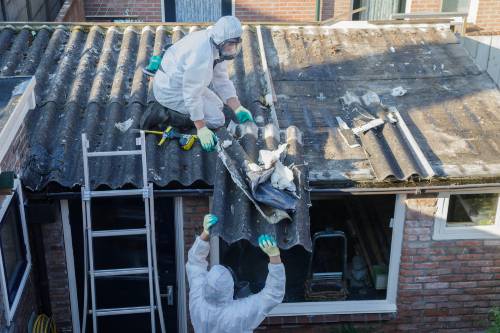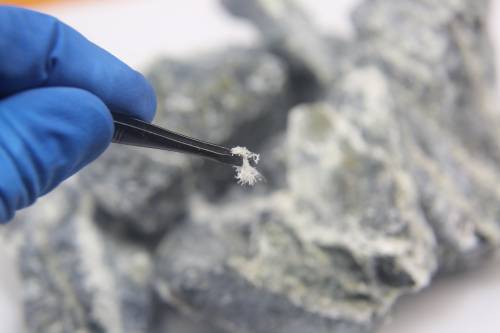
Asbestos is a mineral that was previously used in many building materials due to its strength, heat resistance and resistance to fire. However, it has since been found that exposure can lead to a number of serious health problems, including mesothelioma, asbestosis and lung cancer. Safe asbestos removal can also be very costly.
If you are in the construction industry or work with any materials that contain asbestos, it is important to take out specialist cover to protect yourself and your business from the risk of any potential claims as well as the costs associated with using specialist asbestos removal contractors.
What is Asbestos?
It is a naturally occurring mineral that has been used in a variety of commercial and industrial applications for centuries. For a long time it was considered an ideal material for insulation, soundproofing, and fireproofing due to its insulating, heat-resistant and fireproof properties.
Types of Asbestos
There are six different types, some of which can be more dangerous than others:
- White asbestos (Chrysotile) is the most widely used form. It can still be found today in the roofs, ceilings, walls and floors of homes and businesses. Manufacturers also used chrysotile asbestos in automobile brake linings, gaskets and boiler seals, and insulation for pipes, ducts and appliances.
- Brown asbestos (Amosite) was most often used in cement sheets, pipe insulation and other external building works. It can also still be found in insulating board, ceiling tiles and thermal insulation products.
- Blue asbestos (Crocidolite) was generally used to insulate steam engines. It was also sometimes used in some pipe insulation, spray-on coatings, plastics and cement products.
- Grey/green asbestos (Anthophyllite) can range from grey to a dull green or white colour. It was used in limited quantities for insulation products and building materials and also occurs as a contaminant in chrysotile asbestos, vermiculite and talc.
- Grey/green asbestos (Tremolite and actinolite) are two chemically similar minerals which can be brown, white, green, grey or transparent. They’re not used commercially, but they can be found as contaminants in chrysotile asbestos, vermiculite and talc.
It can also be divided into two mineral types: serpentine asbestos and amphibole asbestos.
Serpentine asbestos has curly fibres made up of sheets of crystals. The single type of asbestos from the serpentine family, chrysotile, has historically accounted for more than 95% of all asbestos used around the world.
Amphibole asbestos has needle-shaped fibres that are considered much more dangerous than serpentine asbestos. Amosite and crocidolite are the most commercially valuable types of amphibole asbestos, while anthophyllite, tremolite and actinolite are forms used non-commercially.
Studies suggest it takes much less exposure to amphibole asbestos to cause cancer, compared to serpentine asbestos.
However, while some can be more dangerous than others, all types are classified as cancer causing substances, so have a degree of associated health risk that should be taken very seriously. When working with this material or carrying out asbestos removal from a property, very specific precautions need to be taken.
Dangers of Asbestos

Individuals exposed to asbestos face health risks including cancer and other illnesses. Asbestos is made up of long, thin fibres that can be easily inhaled into the lungs. Once asbestos fibres are inhaled, they can remain in the body for many years, as they don’t break down. This can cause a build-up of scar tissue around the fibres.
This scar tissue can eventually lead to a serious lung condition known as asbestosis. As well as asbestosis, inhalation of the fibres can cause lung cancer, mesothelioma (a rare but deadly form of cancer that affects the lining of the lungs) and other diseases. Exposure is also linked to an increased risk of gastrointestinal cancers.
So as exposure can lead to very serious health problems, precautionary steps need to be taken to avoid inhalation of the fibres. This includes during asbestos removal as well as when working with asbestos containing materials.
Where Asbestos is Found
It has been used in a variety of products and materials, including insulation, brake pads, and flooring, and is found in many building materials.
It is most commonly found in older buildings, as it was widely used in building works prior to the 1980s.
Anyone planning to renovate an old home, office or building should be aware of the potential risks of exposure and take appropriate precautions. If you suspect that a product or material contains asbestos, it is important to contact a trained professional who can carry out a survey and safely remove it if they find asbestos.
Specialist Asbestos Insurance
Those who work in the building industry and are exposed to this hazardous material during the course of their work could be at risk of developing asbestos-related illnesses.
As a result, those who work in this industry need to be very careful when handling materials that may contain this material. When demolishing an older building, for example, it is important to have a professional do an asbestos survey to inspect the site for hazardous materials before beginning work. If they find any, special care must be taken to remove asbestos safely.
However the cost of dealing with this can be significant, and that’s why many building companies purchase specialist asbestos related cover. This insurance helps to cover asbestos removal from a job site and also provides protection in case someone becomes ill from exposure to the material. With the right insurance in place, building companies can protect themselves from the financial risk associated with hazardous materials like this.
Specialist insurance can also provide protection against the cost of treating related illnesses, as well as providing compensation for lost earnings if workers are forced to take time off work due to their illness. It can help to cover the costs of medical treatment, lost income, and other expenses associated with the condition.
Without specialist insurance, these companies would be at risk of financial ruin if any of their workers developed an asbestos-related illness.
Specialist asbestos related insurance can protect you and your business from a potential claim.
Types of insurance that can include asbestos cover

- Public liability insurance – this would cover you for the risk of any damage to a third party property you may undertake work on and is a legal requirement.
- Employers liability insurance – this covers your business for compensation costs if an employee becomes ill or injured because of the work that they undertake on your behalf and is also a legal requirement for any company who employs at least one person (not sole traders).
- Professional indemnity insurance – this covers you for alleged negligence or breach of duty arising from an act in the performance of professional services in your job and is highly recommended for those undertaking surveying, management or consultancy work.
While each of the above types of insurance policy don’t necessarily include cover relating to asbestos, you can see how important it would be to include such cover in each if you are in the building industry. It can have serious financial implications when it comes to using specialist asbestos removal contractors, if any employees become ill as a result of being exposed to it or if you as a professional give advice regarding asbestos that turns out to be incorrect.
So if you work in an industry where you or your employees work with or may come across any hazardous materials, it is important to take out specialist insurance to protect yourself and your employees against the health risks, cover asbestos removal costs and protect your business from any potential asbestos related claims.
Expert Knowledge
Asbestos cover is a specialist area and so it’s important that you choose an insurer who thoroughly understands the industry. At Construction Insure, the companies we use to provide insurance for asbestos related risks:
- Have over 100 years of experience in insurance services.
- Are specialists in asbestos related insurance with regards to professional indemnity and public liability.
- Will provide a competitive premium without compromising on the cover you need.
Specialist insurance can provide you with the peace of mind knowing that you and your employees are taken care of and that your business is protected in the event that someone makes a claim against you.
Construction Insure are experts in the industry providing market leading insurance solutions. We are specialists in Contractors Insurance (including Asbestos Contractors Insurance), so why not get in touch today to find out how we can help protect your business?

